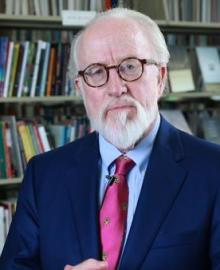 Peter Medine,Professor Emeritus, Department of English, University of Arizona
Peter Medine,Professor Emeritus, Department of English, University of Arizona
Wednesday, January 17, 2024,
2:30pm-3:30pm,
ASA Koffler Great Room and Zoom
Two opposing aspects of Macbeth’s character, the heroic and the criminal, touch on the mystery of the evil of which the most gifted and morally astute human beings may be capable. In so doing, Macbeth continues to speak to and compel audiences—indeed, today perhaps more so than ever.
Among Shakespeare’s tragic heroes, Macbeth stands out for his criminality. He murders his benevolent, aged monarch, who is asleep as his house guest. At the same time Shakespeare invests Macbeth with an extraordinary conscience. Soon after he has determined to commit the regicide, he expresses his full understanding of the crime and its manifold injustice. Nothing can exculpate the action, and Macbeth acknowledges that he has “No spur to prick the sides of [his] intent, but only / Vaulting ambition.” So what qualifies him as heroic? It’s his moral imagination that appears as he visualizes the horror of the consequences of what he’s undertaking. The visualization is most often expressed in densely compacted similes and metaphors borrowed from the Book of Revelations. At such moments, Macbeth approaches
the poetry of the prophet. Deepening the characterization is the terrible irony that this facet of Macbeth is integral to his consciousness of his cold-blooded criminality. The irony goes to the heart of the profound tragedy of Macbeth, whose heroic stature derives from such complexity.
Peter E. Medine is Professor Emeritus at the University of Arizona where he served in
the English Department from 1969 to 2014. He has written, edited, or co-edited seven
books in Early Modern English studies. His most recent co-edited book is Visionary
Milton: Essays in Prophecy and Violence (2010). He is the recipient of several
Humanities Seminars Superior Teaching Awards and the College of Humanities Award
for Outreach Service.
Compiled and edited by Rosemary Brown
You can connect to Zoom either by using the following URL: https://zoom.us/j/95456511620?pwd=OC9GcnJRNmJpMTdXdXFhaUpCUkx4QT09 or by opening a browser to zoom.com/join and typing in Meeting ID: 954 5651 1620 and Passcode: 85747
